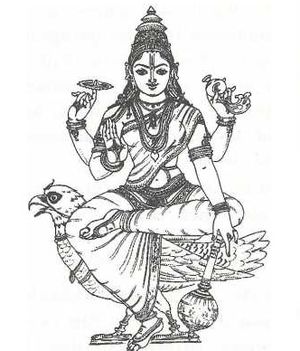Nārāyaṇī
From Hindupedia, the Hindu Encyclopedia
By Swami Harshananda
Nārāyaṇī literally means ‘the spouse or power of Nārāyaṇa’.
As the very name suggests, she is the śakti or female counterpart of Nārāyaṇa
Nārāyaṇī is a well-known name of Durgā too. The Devīmāhātmya contains a long hymn[1] on Nārāyaṇī and is known as the Nārāyaṇistuti. Nārāyaṇī or Nālāyanī was also the name of the sage Mudgala’s wife, her other name being Indrasenā. It was she who was reborn as Draupadī in her next birth.[2]
References[edit]
- The Concise Encyclopedia of Hinduism, Swami Harshananda, Ram Krishna Math, Bangalore

